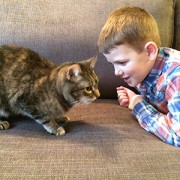Nikki Schneck, a veterinary technician near Pottsville, PA, contributed to this article.
Many cats are notorious for not drinking much water. This makes them prone to constipation. It would be a major error to take this condition lightly. Constipation is never normal. It can lead to a lot of suffering and a poor quality of life, so it should be taken seriously. Why is constipation in cats a big deal?
Why is constipation in cats a big deal?
First, constipation is not a pleasant experience for any cat. Second, repeated episodes of constipation can cause irreversible enlargement of the colon. Serious constipation can lead to a condition where the cat cannot expel stools at all, and needs an enema. At worst, a cat can be so blocked up or “impacted,” and the colon so enlarged, that surgery is the only option.
What causes constipation in cats?
The most common causes of feline constipation are:
- Dehydration
- Painful defecation
- Stress in the home
- A dirty litter box
- A disease
Identifying the cause is not always easy, but it’s important so that we can manage the constipation and reduce the chances of it worsening. A thorough discussion with your family vet will help you determine the cause.
Your vet may ask:
- Was there a change in diet?
- Was there a change in water intake?
- Is your cat on any medication?
- Are there any painful joints that might keep your cat from reaching the litter box?
- Is there excessive licking or grooming?
- Could it be a litter box issue?
- Was the type of litter changed?
- Is the litter box cleaned often enough?
- Are there multiple cats and not enough litter boxes?
- Is there a source of stress in the household, such as a new cat or a new dog?
How can you prevent constipation in cats?
Here are several ways to decrease the risk of constipation in cats:
- Feeding your cat canned food is an easy way to increase water intake. Dry food may contain about 10-20% water, whereas canned food may have 80%
- Make sure there are multiple litter boxes if you have several cats
- Clean each litter box at least once daily
- Different cats prefer different types of litter. Make sure your cat seems happy with the litter you choose
- Discuss a daily laxative with your veterinarian
- Increase exercise and playful activities
What are the signs of constipation in cats?
Constipated cats may be seen straining in the litter box. When in pain, constipated cats may vocalize during defecation. They often have decreased thirst and appetite. Constipation can also cause vomiting.
It is important to differentiate constipated cats from cats with urinary blockage. At first glance, they may look the same: straining in the litter box. However from a medical standpoint, the two conditions are radically different.
Testing for constipation in cats
As always, your family vet will start with a thorough physical exam. Diseases of the anus or rectum can cause pain during defecation.
Blood work may reveal a metabolic disease, such as low potassium or high calcium. It also can show dehydration.
A colon full of stool can be felt or palpated during the exam, unless the cat is seriously overweight.
For overweight cats, an X-ray of the belly can be taken to assess the extent of the situation and the size of the colon. In addition, an X-ray of the pelvis may reveal old, untreated fractures causing a mechanical blockage, which can prevent stools from being expelled.
Treating constipation in cats
Depending on the severity of constipation, treatment may include:
- Fluids, IV or under the skin (rehydration)
- Manual removal of stools, along with an enema (from your veterinarian)
- A diet change, that is rich in fibers
- A laxative
- Drugs (called promotility drugs) to move food and fecal matter “downward”
- In extreme cases, surgery is required to remove the colon, which is then called a megacolon
Why could my constipated cat need surgery?
Extreme or terminal constipation is called obstipation. A cat with obstipation is suffering and has a miserable quality of life. The colon is so stretched by large, rock-hard stools, that it is incapable of expelling them. The muscles of the colon become unable to do their job. In those cases, medications, diet changes and enemas become useless. The goal of surgery (called a colectomy) is to remove the diseased, giant colon. Usually performed by a board-certified surgeon, this delicate surgery can be a life-saving procedure. Quality of life is typically excellent after surgery.
Questions to ask your veterinarian:
- How can we treat my cat’s early constipation?
- Are we catching his condition early enough?
- Does my cat need surgery?
If you have any questions or concerns, you should always visit or call your veterinarian -- they are your best resource to ensure the health and well-being of your pets.
